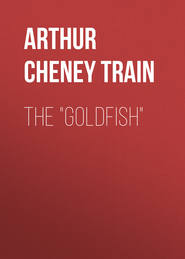По всем вопросам обращайтесь на: info@litportal.ru
(©) 2003-2024.
✖
The Confessions of Artemas Quibble
Настройки чтения
Размер шрифта
Высота строк
Поля
SIDDONS KELLEY AN ACTOR
As may well be supposed, my professional career uptown was vastly more entertaining than my experiences at Haight & Foster's. My afternoons were filled with a constant procession of clients of all ages, sexes, colors, and conditions. As the business grew and greater numbers of persons signed our contracts and received their honorarium of a dollar a month, a constantly increasing percentage of criminal or semi-criminal cases came to the office. Of course there was no better criminal lawyer than Gottlieb in the city, and before long the criminals outnumbered our civil clients. At the same time I noticed a tendency on the part of the civil business to fall off, the reason for this probably being that my partner was known only as a criminal attorney. Now, I began to dislike the idea of paying a dollar a month to induce people to refer business to us, and indeed I found that the disbursement of five or six hundred dollars every four weeks for this purpose was no trifling matter. Accordingly I decided to try letting them go for a month or so, but business fell off to such an alarming extent that I almost immediately resumed the contract system, merely reducing its proportions.
In addition to our "dollar-a-monthers," as we called them, Gottlieb employed half a dozen professional "runners," whose sole occupation it was to hunt down unfortunate persons injured accidentally and secure their cases. These employees made a business of joining as many social clubs, labor and other organizations as possible and swinging the business in Gottlieb's direction. At one time the competition for accident cases became so fierce that if a man were run over on Broadway the rival runners would almost tear him limb from limb in their eagerness to get his case; and they would follow a dying man to the hospital and force their way on one pretext or another to his bedside. There used to be a story, which went the rounds of the clubs and barrooms, of a very swell old buck who owed an enormous amount of money and who happened to be knocked down and rendered insensible by a butcher's wagon. He was taken to the hospital and did not regain consciousness for several hours. When at last he opened his eyes he saw several dozen cards plastered upon the ceiling directly over his head, reading:
GO TO
LEVY & FINKLESTEIN
ATTORNEYS-AT-LAW
WE GET YOU MONEY!
TRY
EINSTEIN & GOLDBERG
IN THE BUSINESS 30 YEARS
SOLOMONS & MEYER
ATTORNEYS
CAN GET YOU
$5000 FOR A LEG
$10,000 FOR A LIVER
MOSES BLOOM THE HONEST LAWYER
SAMUEL SHARP COUNSELLOR-AT-LAW
"Ah!" he murmured, rubbing his eyes and turning to the nurse; "I thought I was in some strange place, but I see that all my friends have been to call already!"
Our criminal business, however, was so extensive that it took practically all of Gottlieb's time, and he found it necessary to hire a couple of clerks to attend to the civil cases that came to us. My partner was obliged to spend the whole of almost every day in attendance at the criminal courts. Frequently he remarked jestingly that under the circumstances, as he had to give all his time to it anyway, he could as easily attend to all the criminal business of the city as to the small part of it that came to him.
"Well," I said to him one day, "why don't you?"
"Why don't I what?" he retorted.
"Get all the criminal business there is," I answered.
"Quib," he exclaimed excitedly, "have you got another of your ideas?"
"I think so," I returned. "How does this strike you? Why not issue a policy, like life or accident insurance, in which for a moderate sum you agree to defend free of charge any man accused of crime? You know that every criminal is always trying to save up money against the time when he shall be caught and have to hire a lawyer. Now, it is true that these fellows pay very well, but there are not many that can pay a large fee. If you could get enough crooks to take out a policy at ten dollars per year you might make a good thing of it."
"But how would we get our scheme going?" inquired my partner, with a gleam in his eye. "It certainly is a gold mine, if it will work."
"Leave the thing to me," I admonished him.
That evening I drew up with great care a policy of insurance against the loss occasioned by having to employ counsel if arrested for crime. On its back was indorsed the following insidious philosophy:
"Innocent men, as well as guilty, are frequently arrested for violating the law. This costs money. Lawyers are notorious extortioners. For ten dollars a year we guarantee to defend you for nothing if charged with crime. Twenty-five dollars insures entire family. We make no distinction between ex-convicts and others.
"ABRAHAM GOTTLIEB,
"Of Counsel."
My next task was to boom my scheme by successful advertising, and with this in view I persuaded Gottlieb to issue free policies to a dozen or so of the worst rascals that he knew. Naturally it was not long before one of them was arrested for some offence, and Gottlieb as naturally succeeded in getting him off, with the natural result that the fellow went all over town telling how one could be a burglar with impunity for ten dollars a year. At about the same time I heard of a man who was in the Tombs charged with murder, but who was almost certain to get off on account of the weakness of the case against him. I, therefore, visited the defendant and offered to give him a policy for ten dollars, in spite of the fact that he was already in jail. He snatched readily enough at the chance of getting as good a lawyer as Gottlieb to defend him for ten dollars, and when he was acquitted made so much of it that there was hardly a prisoner in the Tombs who did not send for one of our policies to guard against future legal difficulties. To all of these we offered free advice and a free trial upon the charges pending against them, as a sort of premium or inducement to become policy-holders, and in six months had over two hundred subscribers. This meant in cash about two thousand dollars, but it necessitated defending any or all of them whenever they were so unfortunate as to run foul of the police, and as luck would have it out of the two hundred policy-holders forty-seven of them were arrested within the first six months—fifteen for burglary, eleven for robbery and assault, sixteen for theft, and five for murder. These latter cases took all of Gottlieb's working hours for some seven and a half weeks, at the end of which time he threw up his hands and vowed never to insure anybody against anything again. It was impossible for me to try any of the cases myself, as I was not as yet admitted to the bar, and the end of the matter was that we returned the premiums and cancelled the policies of the remaining one hundred and fifty-three insured. This done, Gottlieb and I heaved sighs of mutual relief.
"You are a clever fellow, Quib," he acknowledged good-naturedly, "but in some ways you are ahead of your time. You ought to have gone into life insurance or railroading. Your genius is wasted on anything that ain't done wholesale. Let's you and me just stick to such clients as come our way in the natural course of events. There isn't any one born yet big enough to do all the criminal law business in this little old town by himself."
And in this I with some regret agreed with him.
CHAPTER IV
As I have already taken some pains to indicate, I was fully persuaded of the practical value of a professional connection with a legal firm of so eminent a standing as that of Messrs. Haight & Foster, and for this reason the reader may easily appreciate the shock with which I received the information that my presence was no longer desired in the office.
Mr. Haight had unexpectedly sent for me word that I was wanted in the library and I had obeyed his summons without a suspicion that my career as a civil attorney was to be abruptly terminated. As I closed the door behind me I saw the old lawyer standing near the window, his spectacles poked above his eyebrows and his forehead red with indignation. Between the thumb and forefinger of his left hand he held a card.
"So," he exclaimed, vainly trying to appear collected, "I find that my firm has been conducting an uptown office for criminal business! This is one of your cards, I believe?"
He tossed it from him as if it were infected with some virulent legal disease, and I saw that it was one of the unfortunate cards that I had had printed before forming my partnership with Gottlieb. It was no use denying anything.
"Yes," I answered, as quietly as I could, "it is one of my cards."
"I am also informed," he continued, his voice trembling with suppressed wrath, "that while you have been masquerading as a student in this office you have been doing a police-court law business in association with a person named Gottlieb."
I turned white, yet made no traverse of his indictment. I was going to be kicked out, but I felt that I could at least make my exit with a dignified composure.
"Young man, you are no longer wanted here," continued Mr. Haight with acerbity. "You have found your own level without assistance and you will no doubt remain there. You obtained your position in this office by means of false pretences. I do not know who you really are or whence you really come, but I have no doubt as to where you will eventually go. This office does not lead in the right direction. You ought to be locked up! Get out!"
I went.
Glib as I was in the defence of others I found it difficult to argue in my own behalf. At any rate, it would have availed nothing. I had been tried, convicted, and sentenced in my absence, and it was vain to hope for pardon. There is something in righteous indignation that inevitably carries respect with it. I fully sympathized with Mr. Haight. I had cheated and outraged his firm and I knew it. I had no excuse to offer and he was entitled to his burst of excoriation. Morally I felt sure that the worm that had worked deepest into his bone was the fact that my guardian, whose name, as the reader may recall, I had made use of as an introduction, had not in fact written "Tottenham on Perpetuities" at all.
Thus I passed out of the office of Haight & Foster much as I had slipped in—quite unostentatiously. All hope of success along the slow and difficult lines of legitimate practice faded from my mind. Whether I willed it or not, as a criminal attorney I was destined to make my bread.
There was now no reason why Gottlieb and I should any longer conceal our partnership, and we decided, therefore, to go into things on a much larger scale than theretofore, and hired a suite of offices on Centre Street, near the Tombs, where we could be within easy reach of the majority of our clients. A sign some forty feet long and three feet wide ran along the entire front of the building, bearing the names Gottlieb & Quibble. Our own offices were in the rear, the front rooms being given over to clerks, runners, and process servers. A huge safe bought for a few dollars at an auction stood in the entrance chamber, but we used it only as a receptacle for coal, its real purpose being simply to impress our clients. We kept but few papers and needed practically no books; what we had were thrown around indiscriminately, upon chairs, tables—even on the floor. I do not recall any particular attempt to keep the place clean, and I am sure that the windows were never washed. But we made money, and that was what we were out for—and we made it every day—every hour; and as we made it we divided it up and put it in our pockets. Our success from the start seemed in some miraculous way to be assured, for my partner had, even before I knew him, established a reputation as one of the keenest men at the criminal bar.
As time went on our offices were thronged with clients of all sexes, ages, conditions, and nationalities. The pickpocket on his way out elbowed the gentlewoman who had an erring son and sought our aid to restore him to grace. The politician and the actress, the polite burglar and the Wall Street schemer, the aggrieved wife and stout old clubman who was "being annoyed," each awaited his or her turn to receive our opinion as to their respective needs. Good or bad they got it. Usually it had little to do with law. Rather it was sound, practical advice as to the best thing to be done under the circumstances. These circumstances, as may be imagined, varied widely. Whatever they were and however little they justified apprehension on the part of the client we always made it a point at the very outset to scare the latter thoroughly. "Conscience doth make cowards of us all." But a lawyer is a close second to conscience when it comes to coward-making; in fact, frightening people, innocent or guilty, became to a very large extent our regular business.
The sinners most of them live in daily terror of being found out and the virtuous are equally fearful of being unjustly accused. Every one knows how a breath of scandal originating out of nothing can wither a family and drive strong men to desperation. The press is always ready to print interesting stories about people, without inquiring too closely into their authenticity. Curiously enough we found that an invitation to call at our office usually availed to bring the most exemplary citizens without delay. I can remember not more than three who had the courage to refuse. Most came, as it were, on the run. Others made a bluff at righteous indignation. All, in the end, paid up—and paid well. Our reputation grew, and in the course of a few years the terror of us stalked abroad through the city.
Our staff was well organized, however disordered may have been the physical appearance of our office. In the first place we had an agent in every police court who instantly informed us whenever any person was arrested who had sufficient means to make it worth our while to come to his assistance. This agent was usually the clerk or some other official who could delay the proceedings in such a way as to give us time to appear upon the scene. We also had many of the police in our pay and made it a practice to reward liberally any officer who succeeded in throwing us any business. In this way defendants sometimes acquired the erroneous idea that if they followed the suggestion of the officer arresting them and employed us as their attorneys, they would be let off through some collusion between the officer and ourselves. Of course this idea was without foundation, but it was the source of considerable financial profit to us, and we did little to counteract the general impression that had gone abroad that we "stood in" with the minions of the law and were personae gratae to the judges of the police courts.
After the telephone came into general use Gottlieb employed it in many ingenious ways. He even had an unconnected set of apparatus hanging on the wall of the office, through which he used to hold imaginary conversations with judges and city officers for the benefit of clients who were in search of "inflooence." It is a common weakness of the layman to believe that more can be accomplished through pull than through the merit of one's cause. Even litigants who have the right on their side are quite as apt to desire an attorney who is supposed to be "next" to the judge as are those whose only hope is through judicial favor. Gottlieb's relations to the lower magistrates were in many instances close, but he professed to be on the most intimate terms with all who wore the ermine, whether in the police courts or on the supreme bench. Time after time I have overheard some such colloquy as the following. A client would enter the office and after recounting his difficulties or wrongs would cautiously ask Gottlieb if he knew the judge before whom the matter would come.









